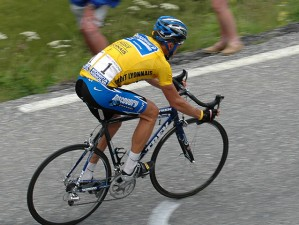
"It's a great rarity today for someone to achieve athletic success who doesn't take drugs." That quote seems rather timely, in the wake of the news that cyclist Lance Armstrong will no longer fight the accusations of doping leveled at him by the U.S. Anti-Doping Agency. The charges may cost Armstrong all seven of his Tour de France titles. The development in Armstrong's case follows two recent drug suspensions in baseball-in the past 10 days Melky Cabrera, an All-Star outfielder for the San Francisco Giants, and Bartolo Colón, a starting pitcher for the Oakland Athletics, both received 50-game bans after testing positive for artificial testosterone.
"如果現(xiàn)在有人不通過(guò)服藥而在體育賽事上獲勝,那是十分罕見的。"隨著自行車手阿姆斯特朗接受美國(guó)反興奮劑機(jī)構(gòu)調(diào)查其服用藥物一事落下尾聲,引用這句話顯得十分及時(shí)。這次對(duì)阿姆斯特朗的判決將取消他的7個(gè)環(huán)法冠軍頭銜。緊接著阿姆斯特朗的案件,最近兩起棒球賽事的服藥事件——過(guò)去10天,效力于舊金山巨人隊(duì)的全明星外場(chǎng)手Melky Cabrera和奧克蘭運(yùn)動(dòng)家隊(duì)的先發(fā)投手Bartolo Colón被查出因服用人造睪丸激素而呈現(xiàn)陽(yáng)性,兩個(gè)人得到500場(chǎng)禁賽的處分。
But the quote above has nothing to do with modern-day athletics. It comes from a retired track coach quoted in a 1971 New York Times Magazine article. (The article's author, sportswriter and activist Jack Scott, who died in 2000, has one of the more interesting biographies you'll find-Oberlin College athletic director, Bill Walton confidant, onetime suspected associate of the Symbionese Liberation Army.) Whether or not the coach's statement then was somewhat hyperbolic, it's clear that the drug problem has loomed over the sports world for a long time. And although the abuses in cycling have become harder to ignore in just the past two decades, the sport has been home to all manner of chemical enhancements for more than 100 years.
上述引用的句子與現(xiàn)代體育無(wú)任何關(guān)聯(lián)。它是一個(gè)退休的田徑教練從1971年的《紐約時(shí)報(bào)》的一篇文章引用的一個(gè)句子。(這篇文章的作者Jack Scott,體育專欄作者和激進(jìn)主義分子,2000年逝世,著有很有意思的自傳,如《奧柏林學(xué)院體育系主任》,《比爾沃頓密友錄》,《懷疑是共生解放軍的同事》)。不管這個(gè)教練的說(shuō)法有否點(diǎn)夸張,很明顯涉藥問(wèn)題很長(zhǎng)時(shí)間在體育界已愈發(fā)凸顯。盡管在過(guò)去的20年里,自行車的涉藥事件很難忽視,體育成為化學(xué)增強(qiáng)劑的常客已有100多年之久。
Jacques Anquetil, a French cyclist who won the Tour de France five times in the 1950s and 1960s, openly admitted to doping. "Everyone in cycling dopes himself," he said in Scott's 1971 article. "Those who claim they don't are liars." In Anquetil's era, the agents of choice were stimulants such as amphetamines, but as early as the late 1800s cyclists fueled up with a mixture of coca leaf extract and wine called Vin Mariani, according to a 1983 Hastings Center report.
曾經(jīng)在1950s和1960s間五次獲得環(huán)法冠軍的法國(guó)自行車手Jacques Anquetil,公開承認(rèn)服用藥物。在Scott1971年的文章中,Jacques Anquetil 說(shuō):"每個(gè)自行車手都有服藥。"同樣,"每個(gè)不承認(rèn)他服過(guò)藥的人都是騙子。"在Anquetil眼里,藥物的選擇有像安非他命這樣的刺激物,但在1800s晚期,據(jù)海斯汀中心1983年的報(bào)道,自行車手刺激興奮的選擇包括可卡葉的提取物和一種叫做維馬里亞尼酒的混合品。
Baseball, too, had its period of rampant amphetamine use, which is viewed in an almost nostalgic light now that stronger performance enhancers such as anabolic steroids and human growth hormone have tainted the game's image. But in endurance sports such as cycling, performance enhancement can be especially deadly. At the 1960 Summer Olympics in Rome, a Danish cyclist named Knud Enemark Jensen lost consciousness during a race, fell from his bicycle and died. Postmortem tests reportedly revealed the presence of amphetamines in his system. After English rider Tom Simpson collapsed and died during the 1967 Tour de France, amphetamines were found both in his bloodstream and in a vial tucked inside his jersey.
同樣地,棒球也有一段泛濫的安非他命用藥期,這在今天看來(lái)顯得有點(diǎn)過(guò)時(shí)。現(xiàn)在更強(qiáng)力的增強(qiáng)劑,如同化激素和生長(zhǎng)激素玷污了比賽的形象。但在耐力比賽,尤其是自行車這樣的比賽中,性能增強(qiáng)劑是致命的。在1960年羅馬夏季奧運(yùn)會(huì)上,一名來(lái)自丹麥的自行車手Knud Enemark Jensen在比賽中失去知覺,從車上倒下死亡。驗(yàn)尸報(bào)告顯示在他的體內(nèi)發(fā)現(xiàn)安非他命。此后,英國(guó)自行車手Tom Simpson在1967年的環(huán)法比賽上死亡,在他的血液和塞在運(yùn)動(dòng)衣的小瓶里也都發(fā)現(xiàn)了安非他命。
More recently, cyclists have boosted their endurance with the use of an artificial version of the hormone erythropoietin, or EPO, which stimulates red blood cell production and boosts the oxygen-carrying capacity of the blood. Danish cyclist Bjarne Riis, who won the 1996 Tour de France, later admitted that he used EPO during that time.
最近,自行車手服用人造的激素促紅細(xì)胞生成素或稱作EPO使耐力增強(qiáng)。EPO刺激紅細(xì)胞生成,增大血液載養(yǎng)量。1996年環(huán)法冠軍,來(lái)自丹麥的自行車手Bjarne Riis,后來(lái)承認(rèn)他在比賽時(shí)服用EPO。
EPO thickens the blood, and it also has proved dangerous. After a spate of suspicious rider deaths, a 1991 New York Times article highlighted the deadly potential of the drug du jour. "There is no absolute proof, but there's so much smoke that most of us are convinced," University of Oklahoma hematologist Randy Eichner told the newspaper. "You just don't get 18 deaths in four years, mysteriously, with 10 of them attributed to cardiac problems."
EPO雖然使血液變稠, 但它也被證明是危險(xiǎn)的。在大量可疑的自行車手死亡后,1991年《紐約時(shí)報(bào)》的一篇文章突出了自行車比賽用藥的潛在致命后果。奧克萊大學(xué)血液病醫(yī)生Randy Eichner說(shuō):"雖然沒有絕對(duì)證據(jù)指出這一危險(xiǎn),但正如我們確信的那樣,這的確有貓膩。""不可能在4年平白無(wú)故產(chǎn)生18起死亡案例,而且其中10例都是心臟問(wèn)題。"
Cycling insiders, too, noticed drastic changes in 1991. That is the year that three-time Tour de France winner Greg LeMond thinks that EPO took over his sport. As he told Scientific American writer Michael Shermer in 2008, "Something was different in the 1991 Tour. There were riders from previous years who couldn't stay on my wheel who were now dropping me on even modest climbs." LeMond had won the race the two previous years, but he fell to seventh place in 1991.
自行車業(yè)內(nèi)人士也在1991年發(fā)現(xiàn)重大變化。這一年3屆環(huán)法冠軍得主Greg LeMond認(rèn)為EPO成為他比賽的焦點(diǎn)。LeMond在過(guò)去兩年贏得比賽但在1991年只得了第七。他在2008年告訴科學(xué)美國(guó)作家Michael Shermer"1991年的環(huán)法比賽有些不同。去年的不如我的自行車手現(xiàn)在在一般的坡道上卻能拋下我。"












